Fundamental Concepts in Python
In python, a function is a block of reusable code that performs a specific task or set of tasks. Function allow you to break your code into smaller more manageable pieces, making it easier to understand and maintain. In this blog, you will get Fundamental Concepts in Python provides many built in functions such as print(),input(),len(),max(),min() etc. But you can also create your own custom function to encapsulate functionality.
For Free, Demo classes Call: 02071171500
Registration Link: Click Here!
Functions having two parts:
1.Function Definition
2.Function call
Defining a function
To define a function in python, you use the def keyword, followed by the function name and a pair of parentheses.
We can write function two ways:
1.Function without arguments
2.Function with arguments
1.Function without arguments
Note: Unlock endless possibilities and boost your career prospects with SevenMentor’s best Python Course in Pune
Function definition :
Syntax:
def function_name():
function body
Function call
function_name()
In Python a function is defined using the def keyword. To call a function, use the function name followed by parenthesis.

Arguments
Information can be passed into functions as arguments.
Arguments are specified after the function name, inside the parentheses. You can add as many arguments as you want, just separate them with a comma.
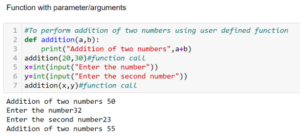
For Free, Demo classes Call: 02071171500
Registration Link: Python Training in Pune!
Default arguments
A default argument is an argument that assumes a default value if a value is not provided in the function call for that argument.
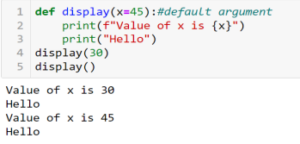
Arbitrary arguments
Arbitrary arguments are used when you want the function to take an unlimited number of arguments. When you add an asterisk ( * ), it will receive a tuple of arguments.

Keyword arguments
You can pass the arguments in a non-positional manner using keyword arguments.
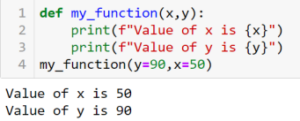
The Return Statement
To return a value from a function, we use a return statement. It “returns” the result to the caller.
A function always returns a value. If a user doesn’t include a return statement, it returns None.

Types of variables in used Defined Function:
Local Variable:
A local variable that is declared inside the function is called local function”. We can access a local variable inside but not outside the function.
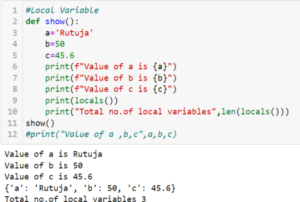
For Free, Demo classes Call: 02071171500
Registration Link: Click Here!
Global Variable
Variables that are created outside of a function are known as global variables. Global variables can be used by everyone, both inside of functions and outside.
Python global keyword allows the user to define a variable globally whose value can be modified outside the current scope.
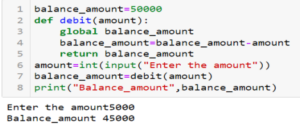
Do visit our Python Video: Click Here
Conclusion
Any programming language must contain functions. A function in Python can take any number of arguments and is defined by the def keyword. Anonymous functions are also supported by Python. They can either provide a single value or several values one by one.
Author:-
Deepali Shinkar
Call the Trainer and Book your free demo Class For Python
Call now!!! | SevenMentor Pvt Ltd.
© Copyright 2021 | SevenMentor Pvt Ltd.

